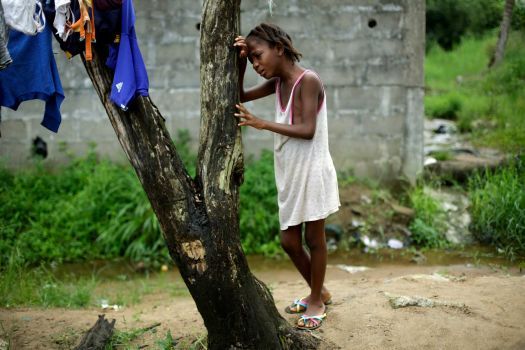
The family of America’s first Ebola patient initially did not comply with an order to stay at home, Dallas officials revealed Thursday amid a scramble to eliminate any chance of the deadly disease spreading.
About 100 people may have had at least brief contact with Thomas Eric Duncan before he was isolated in a Dallas hospital, officials said Thursday, but four members of the 42-year-old Liberian man’s family are of particular concern.
Police officers on Thursday took up posts outside the family’s Dallas apartment to ensure compliance with an official order to stay, County Judge Clay Jenkins said in an afternoon news conference.

BYPASS THE CENSORS
Sign up to get unfiltered news delivered straight to your inbox.
You can unsubscribe any time. By subscribing you agree to our Terms of Use
“They were non-compliant with requests to stay home,” said Jenkins, who did not elaborate.
The news came hours after Liberian officials announced they intend to prosecute Duncan for allegedly lying about his interaction with Ebola just before flying from that country to America last month. Meanwhile, the Texas Senate has scheduled a hearing on the state’s response and readiness in handling Ebola, the Associated Press reported Thursday afternoon. The hearing is set for Tuesday.
Duncan wrote on a pre-flight questionnaire obtained by the Associated Press that he had not cared for an Ebola patient or touched the body of anyone who had died in an area affected by the disease.
Neighbors have said they believe Duncan became infected when he helped bundle a sick pregnant neighbor into a taxi a few weeks ago and set off with her to find treatment.
“He lied on his form,” said Binyah Kesselly, chairman of the Liberia Airport Authority, in announcing the looming prosecution. “If he had answered truthfully, he would have been sent to secondary screening immediately and not allowed to leave.”
Duncan left Liberia on Sept. 19, flying from Brussels to Washington, D.C., and then on to Dallas-Fort Worth, arriving the next day to visit relatives, according to airlines.
He went to a Dallas emergency room after falling ill a few days later but was sent home despite telling a nurse he had been in Ebola-ravaged West Africa. He returned in an ambulance two days later with much worse symptoms and was placed in isolation.
Tests confirmed Duncan had Ebola on Tuesday, making him the first patient diagnosed in the United States with the disease that has sickened more than 7,100 people in West Africa and killed more than 3,300, according to the World Health Organization.
American officials have insisted that a large-scale outbreak is extremely unlikely here, but authorities across the state have rushed to trace anybody here who came in contact with Duncan.
On Thursday, state officials announced the 100 “potential or possible contacts,” a list described as a “very wide net, including people who have had even brief encounters with the patient or the patient’s home.”
None of the 100 have shown any symptoms of the disease, and Ebola is not contagious until symptoms appear, officials said.
The state hopes to soon release a smaller list of those who were more likely to have been exposed, health department spokeswoman Carrie Williams said in a statement.
Another spokeswoman, Christine Mann, declined to give any information about the 100. More information may be available later in the day, she said.
Thomas Frieden, Director of the U.S. Centers for Disease Control and Prevention, did not directly answer a question in an afternoon conference call about whether all 100 are in the Dallas area.
“At this point, there is no workplace or community location where we believe there were any exposures,” Frieden said.
The list does include the four family members, who are not contagious but have been placed under a “strict public health order” requiring them to stay home or potentially face criminal charges.
Jenkins called the order unusual but said it was clearly necessary to both him and Gov. Rick Perry.
David Lakey, the state’s top health official, said in the conference call the family members are being delivered food and having their temperatures taken twice per day.
“The decision to put a control order in place for these individuals was to ensure that we can monitor them as needed,” Lakey said.
The state is not planning to issue any similar orders, he said.
Officials have acted to quarantine an assortment of other contacts, however, including three members of the ambulance crew that took Duncan to the hospital and a handful of schoolchildre he encountered beforehand.
At five schools where children have been asked to stay home, attendance hovered around 86 percent Thursday, said Dallas ISD Superintendent Mike Miles in the news conference. Attendance at those schools is usually about 95 percent, Miles said.
Mayor Mike Rawlings said the situation is isolated in a small area.
“This business is very local,” Rawlings said. “When I say local, I don’t mean Dallas. I mean a very specific neighborhood in the northwest part of Dallas.”
Several of the local officials repeated that the situation is under control.
Duncan is now in serious but stable condition.
Officials on Thursday did acknowledge they have already learned some lessons, however.
Lakey in particularly noted in the conference call that the hospital initially let Duncan go home even after he said he had been to West Africa.
“Unfortunately, connections weren’t made related to travel history and symptoms, and the individuals caring for this individual did not think about the possibility of Ebola,” Lakey said. “Across the United States, people don’t take the travel history as seriously as they need to.”
The Associated Press contributed to this report.


